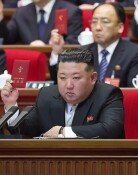[Editorial] Economic Stagnation
The economy showed signs of recovery in the second half of last year, but is slowing down again even before the recovery comes into reality. The gross domestic product growth rate for the second quarter of this year stood at 0.8 percent, the lowest figure ever since last year. With income and jobs decreasing and standard of living dropping, welfare is highly likely to deteriorate. However, there are few statesmen and politicians in the ruling and opposition parties who are concerned about slowing growth and chronic sluggishness and raise an alarm. This makes one wonder if they are silent about growth crisis not to make people nervous by making a fuss, just like they did when North Korea launched missiles.
A Wall Street analyst pointed out, Korea is in the forefront of Asias slowing economy. Other Asian countries, including India and Vietnam, are showing rapid growth, not to mention China which expanded 10.9 percent in the first half. Japan is also out of its economic recession and even worries about excessive investment in facilities. However, the analyst said that Korea has failed to keep the vitality of its economy.
Under these circumstances, the incumbent government puts distribution and welfare, and balance and equity before growth, although it is not enough, even if the government focuses on growth policy. But the only outcome it reaped by stifling the Seoul Metropolitan area and conglomerates is welfare through distributing resources among some people, and preparation for developing an innovation city. Active corporate investment can create decent jobs and retain them, but the government is busy increasing numbers of jobs, saying that it would create social jobs, which is a stopgap measure, by squandering taxpayers money. The outrageous argument of, Let us make an equal society although our per-capita personal income stands at only $10,000, rather than striving to achieve a per-capita income of $30,000, prevails as if it is an economic philosophy.
The government not only displays dismal economic performance far below potential growth rates, but also puts the burden of weakening future growth basis. The potential growth rate, which was in the five percent range soon after the administration was inaugurated, has reportedly declined to the four percent range. While the government has presented an alarming prediction that the potential growth rate will drop to the 1.8 percent range for 10 years from 2030, another shocking warning was released: The potential growth rate could decrease to 1.9 percent for 10 years from 2011 if an expansion of human resources stagnate.
As evident in an officials remark who said, The Roh administration does not ease regulations over the Seoul Metropolitan area purely because of its ideology, the administration has not thrown away ideology and code which already proved failures. Against this backdrop, it is hard to expect that peoples livelihoods would get better again. It is time for economic actors, particularly experts and players in the market, to voice more active arguments for growth.







